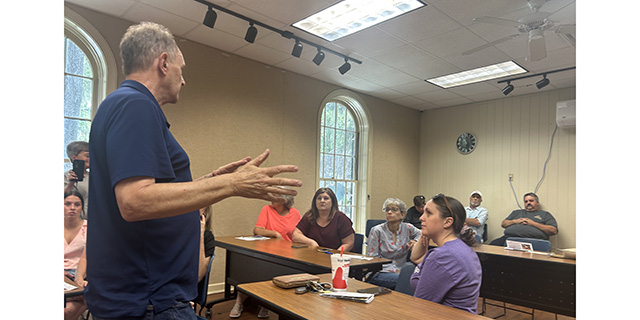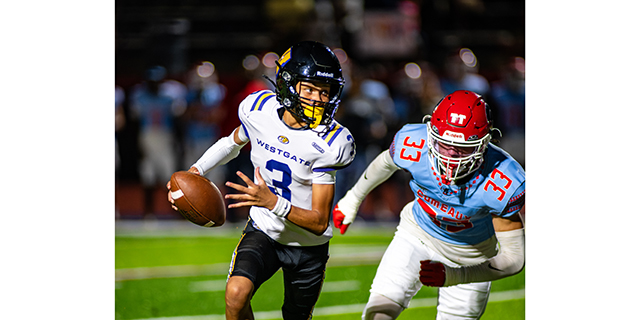Run A Marathon!
Published 10:18 am Friday, January 2, 2015

- Run A Marathon!
By Gail Suberbielle
Running a marathon isn’t necessarily on everyone’s bucket list, but an increasing number of Americans are turning to the 26.2-mile endeavor. According to Running USA’s annual Marathon Report, there were approximately 541,000 marathon finishers in the United States in 2013, up from 487,000 the previous year.
br
Still, that’s only .0017 percent of the entire US population. Are you ready to be counted among that elite number? We’ve compiled a few tips to help wannabe runners tackle their first race, whether it’s a 5K or a full marathon.
br
br
Buy The Right Gear
br
In theory, the only gear you need to get started is a good pair of running shoes. We can’t stress enough, though: buy these from a running specialty store, like Geaux Run or Tri-Running in Lafayette or Varsity Sports or Fleet Feet in Baton Rouge. Stores like these have trained experts who can analyze the way you run and help select the right shoe just for you.
br
And while you may think that a T-shirt and pair of khaki cutoffs is perfectly suitable running attire, you’ll find that clothing designed specifically for running will help tremendously with comfort and ease of movement.
br
One piece of gear that runner Christy Rogers can’t live without is her Garmin, a GPS watch that helps keep track of her pace and mileage. “I have the Forerunner 15, which counts my daily steps and calories,” says the 45-year-old Rogers, a Raceland transplant to Baton Rouge who’s been running for about four years. “I love seeing my miles and my pace increase!”
br
After you’ve been running for a while, you’ll start to learn about and accumulate other gear as well, like BodyGlide or other products to help with chafing (yes, that happens), blinky lights for running in the dark, or headphones if you like to listen to music on the run.
br
Nutritional supplements, which come in many forms, like gels, beverages and jelly beans, for example, also are a key component of the “gear” you’ll need, especially for longer runs. For longtime runner Rhonda Brouillette, the keys are eating a pre-race meal of a bagel and cream cheese, “early-early pre-race,” and hydrating with G2 electrolyte drink.
br
Every runner’s body responds differently to different supplements, though, and training runs are the best place to experiment for the kind, type and frequency of fuel you’ll need to get you through a workout and ultimately, the race.
br
br
Find A Training Partner Or Running Group
br
While some people don’t have any trouble running by themselves, we recommend a training partner or partners or a running group. There are a number of reasons for this, including safety concerns, motivation and even lifetime friendships.
br
For Brouillette, 54, who runs with the varsity sports group, the friendships and conversations are a bonus of training with others.
br
“When you run with someone for two-plus hours at a time, there is a lot exchanged back and forth,” says Brouillette, who says when she drives past landmarks where she’s run with friends that she can recall specific conversations with those runners. “I wish I could bottle those memories,” she says.
br
Rogers agrees, adding that the “sharing of knowledge and experiences” is also key. “If I have a nagging pain, I can almost guarantee someone else has experienced it and can offer help,” she adds.
br
br
Get A Plan
br
Whether you’re a first-time marathoner or have run several races, you’re still going to need a training plan. Training for a race typically involves a serious time commitment – even upwards of 18 or 20 weeks for a longer race – and you have to put in the work to reap the rewards.
br
“It takes a lot of dedication and pre-planning to get your workouts in,” says Rogers.
br
Some running specialty stores, like Varsity Sports in Baton Rouge, offer free marathon and half-marathon training beginning each fall, under the direction of owner/coach Jenni Peters, a former Olympic qualifier who helps runners of all levels achieve their goals. Geaux Run and Tri-Running, both of Lafayette, also offer running groups and information concerning local running coaches. “Laura McGann, the cross country coach at Episcopal School of Acadiana, was available last year to help people training for the Zydeco Marathon,” says Robby Barry of Geaux Run. “She was extremely helpful and willing to help anyone who asked.”
br
Some runners prefer to work one-on-one with a coach (4D and Fresh Jumbie in Baton Rouge are two examples), and there also are a number of reliable training plans available on the web. For example, Hal Higdon, a nationally known runner and writer, offers free training plans for different distance races and levels of runners, which you can find at this website, halhigdon.com/training.
br
br
Set A (Realistic) Goal And Don’t Give Up
br
You may want to simply run a mile or run a faster mile, run your first race or even qualify for the Boston Marathon. But it helps if you have a goal in mind. Choosing a race, like January’s Louisiana Marathon or Half Marathon, and keeping it in your sights can be a runner’s best motivation, not to mention the race medal you know you’ll earn once you cross that finish line.
br
Knowing you’ve met that personal goal can be even better than “bling” around your neck at the end of the race, however.
br
“It sounds like a gross overstatement, but crossing that finish line … might be the proudest moment of my life so far,” says 32-year-old Natalie Smith, who ran her first race, a 10K, in November. “I have accomplished a good bit academically and professionally, but that’s my wheel-house. I always felt that I was never going to be good enough/thin enough/fit enough to be a ‘runner’ or God-forbid, a ‘racer,’ and on that day—at that moment—I was everything I thought I could never be.”
br
Prospective marathoners should also be realistic about the demands on their body, but shouldn’t overlook the impact that training and racing can have on their emotions. The runners we interviewed agree. “Running a marathon is not only a physical challenge, but a mental challenge, too, so be prepared. I quote my favorite Bible verses or positive quotes when my mind tells me my legs are tired,” says Rogers, “but the best part of the marathon distance is the feeling of accomplishment.”
br
“It’s the best kind of competition because your only real competitor is yourself,” adds Smith. “Everyone else, whether they’re miles ahead of or behind you, is in their own struggle. You’re a winner simply because you started.”





